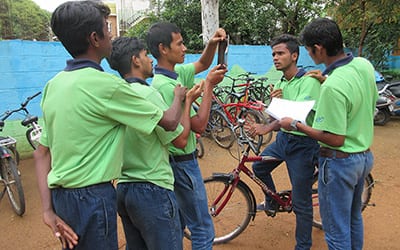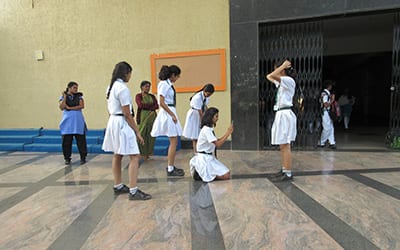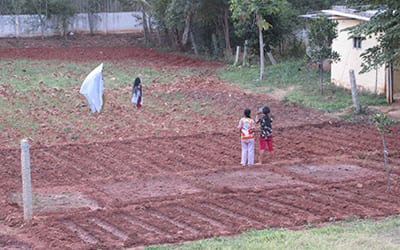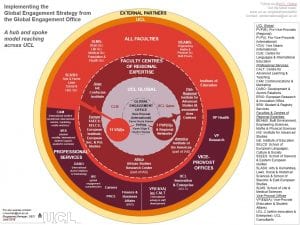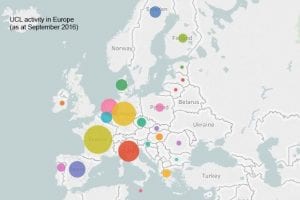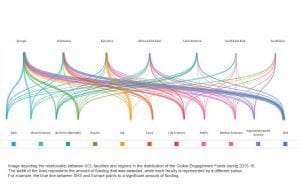Ask an Academic: Dr Adriana Silva De Albuquerque
By ucypsga, on 22 March 2019
 Dr Adriana Silva De Albuquerque is a Research Associate at the UCL Division of Infection and Immunity. Her research interests broadly relate to the study of clinical models of human immunodeficiency.
Dr Adriana Silva De Albuquerque is a Research Associate at the UCL Division of Infection and Immunity. Her research interests broadly relate to the study of clinical models of human immunodeficiency.
She was among recent recipients of the UCL Global Engagement Funds, and last year used the seed funding to travel to a lab at the Karolinska Institutet in Solna, Sweden. We caught up with her to find out more about her research and her partnership with scientists in Sweden.
What are you working on at the moment?
My current project aim is to understand the pathogenic mechanisms of a group of rare, inherited conditions where individual components of the immune system are missing – known as ‘primary immunodeficiency syndromes’.
Our clinical team cares for the largest UK cohort of adults with primary immunodeficiencies for which whole genome sequencing has been performed. I’m developing new immune assays on patients’ cells as well as in cell lines and genetically modified cells, in order to assess the impact of novel genetic variants on immune cell function. With this project, we hope to expand our understanding of the underlying causes of primary immunodeficiencies, as well as to contribute to the development of new diagnostic tests that will hopefully lead to improved treatment of patients.
You were among recent recipients of UCL’s Global Engagement Funds (GEF). What led you to apply for the funds?
The possibility of visiting another lab [at the Karolinska Institute in Sweden] and the chance to become involved in the cutting-edge research they are doing. Having a curious mind and being very enthusiastic to learn more about immunology, I thought this would be a great opportunity for me on a professional level.
Could you give a brief summary of the project that the funds supported?
We are interested in understanding the mechanisms underlying ‘LRBA deficiency’. LPS-responsive beige-like anchor (LRBA) deficiency is a severe primary immunodeficiency characterised by increased susceptibility to infections associated with autoimmune and inflammatory complications. The immune dysregulation caused by this disease results in a significant morbidity and mortality. The only curative approach is hematopoietic stem cell transplantation, which has only been done in a small number of cases.
How did your partnership with the Karolinska Institutet work?
UCL’s Global Engagement Funds enabled me to visit Dr Lisa Westerberg lab at the Karolinska Institutet, our collaborators on this project. Dr Westerberg has a strong expertise in primary immunodeficiencies and I was able to learn and exchange experiences with the PhD students and Post-Docs working in her lab. The time I spent in their lab was very rewarding as I was able to learn new techniques important for our current projects. I also had the opportunity to discuss our data with them, which contributed to the development of new research ideas.
During my stay in Sweden, I also visited the clinical lab based at the Karolinska University Hospital that does all the immunological tests for the diagnosis of primary immunodeficiencies. This was very interesting as I was able to learn some of the tests they are performing and also participate in the daily routine of a top level diagnostic lab.
How did you find the experience of collaborating overseas?
The experience of spending some time in the Karolinska Institute was very positive for me. What contributed most for the success of my stay was that I was able to analyse the LRBA knock-down cells we have genetically modified by electron microscopy, as the Karolinska Institute has a strong expertise in this technique and it was key for this project.
What would your advice be to anyone else hoping to collaborate globally?
Try to identify specific groups you might be interested because of their expertise, knowledge of specific techniques you want to learn or specific projects and ideas you would like to discuss with them. I would say the best way of approaching them would be in international conferences. Try to engage in discussions with scientists of different backgrounds and different levels of expertise. From my experience, scientists are very receptive to this kind of approach.
 Close
Close



